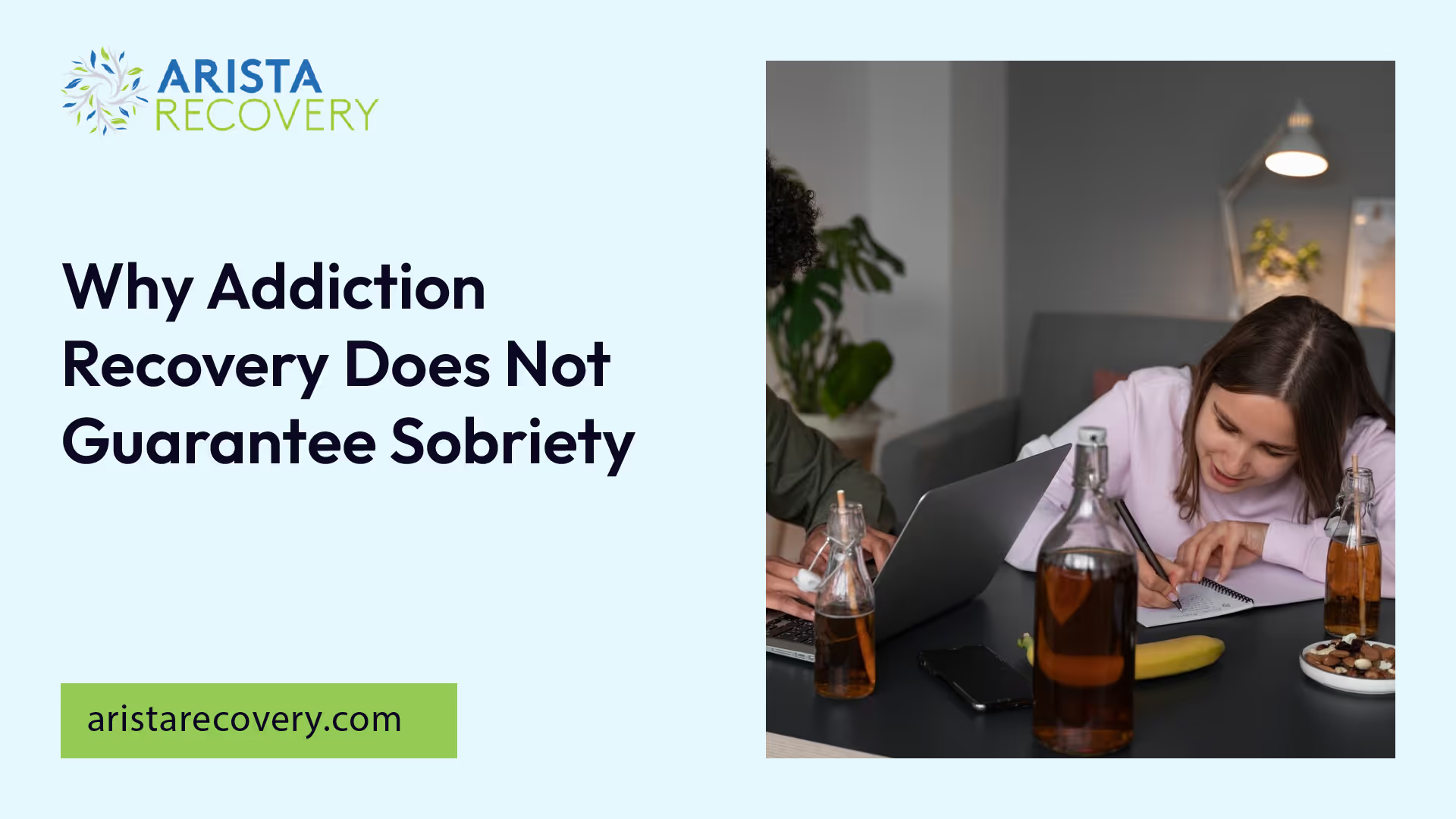Why Addiction Recovery Does Not Guarantee Sobriety


Understanding Addiction
Addiction as a Chronic Disease
Addiction is classified as a chronic disease and is likened to other conditions such as heart disease. If left untreated, addiction can persist for a lifetime and may ultimately lead to death. It affects not only individual health but also has far-reaching consequences for families and communities.
The following table highlights some key statistics regarding addiction:
StatisticValuePercentage of adults with a substance use disorder8.1%Number of people with an opioid use disorderOver 2 millionPercentage of individuals who do not receive treatment90%
Changes in the Brain
Addiction leads to significant changes in the brain, particularly in areas that control judgment, learning, memory, decision making, and behavior. These alterations can severely impair a person's self-control [1].
Substances like alcohol and drugs can profoundly affect the brain's natural reward system. This results in increased cravings, eroded self-control, and the initiation of compulsive behaviors that are often irrational. Individuals may find themselves unable to make sound decisions regarding their health and well-being, driven instead by intense impulses to consume drugs.
The table below summarizes the brain areas impacted by addiction:
Brain AreaFunctionImpact of AddictionPrefrontal CortexJudgment and decision-makingImpaired self-control and rational thoughtLimbic SystemReward and pleasureHeightened cravings for substancesAmygdalaEmotionsIncreased stress and emotional instability
Understanding addiction as a chronic disease and recognizing the changes it brings to the brain are vital steps in dispelling the myth that sobriety guarantees long-term recovery. It emphasizes the need for comprehensive treatment strategies that address these complex changes.
Factors Influencing Addiction
Understanding the factors influencing addiction is crucial, as these elements can impact an individual's vulnerability to developing substance use disorders. Two primary factors are genetic risk factors and environmental influences.
Genetic Risk Factors
Genetics play a significant role in addiction susceptibility. Research indicates that about half of a person's overall addiction risk can be attributed to genetic factors. These genetic predispositions can interact with environmental triggers, amplifying the risk of developing addictive behaviors.
Studies have shown that certain genetic variants may affect how individuals respond to drugs and alcohol, influencing their likelihood of engaging in substance use. Additionally, other risk factors such as childhood trauma, chronic pain, mental health disorders like anxiety and depression can further increase addiction susceptibility [2].
Genetic FactorsImpact on Addiction RiskFamily History of AddictionIncreases riskGenetic VariantsMay alter drug responseMental Health DisordersCan amplify riskChildhood TraumaSignificant contributing factor
Environmental Influences
Environmental factors also significantly contribute to addiction development. These influences encompass a wide array of elements, including upbringing, social networks, and community settings. People from diverse backgrounds, including those with stable jobs and supportive families, can experience addiction.
High poverty areas, exposure to drugs, and negative peer influences can exacerbate challenges associated with addiction. Additionally, stigma, denial, and shame often prevent individuals from seeking help, even when drug or alcohol use negatively impacts their personal and professional lives.
Environmental FactorsDescriptionSocioeconomic StatusImpact of poverty on addiction riskCommunity InfluenceAvailability of drugs and peer pressureUpbringingFamily dynamics and early exposure to substancesStigmaFear of judgment hindering help-seeking behaviors
Examining genetic and environmental factors reveals that addiction is not merely a choice. It results from a complex interplay of influences affecting those struggling with substance use disorders.
Effects of Untreated Addiction
Impaired Self-Control
Untreated addiction can lead to significant impairments in self-control. Research shows that addiction causes changes in the brain that affect areas responsible for judgment, decision-making, learning, memory, and behavior control [1]. These changes can make it difficult for individuals to resist impulses, manage cravings, and make choices that benefit their health and wellbeing.
The following table summarizes the cognitive functions impacted by addiction:
Cognitive FunctionEffect of AddictionJudgmentReduced ability to weigh consequences and make informed decisionsLearningDifficulty in processing new information and experiencesMemoryImpaired recall of past events and experiences related to addictionDecision MakingIncreased likelihood of choosing short-term rewards over long-term benefitsBehavior ControlCompromised ability to regulate responses to triggers and cravings
Long-Term Consequences
The long-term consequences of untreated addiction can be profoundly detrimental, affecting various aspects of a person's life. Without proper treatment, individuals may find that their addiction not only intensifies but leads to lasting health issues, financial instability, damaged relationships, and legal problems.
Some of the long-term consequences include:
The table below outlines potential long-term consequences of untreated addiction:
ConsequenceDescriptionHealth IssuesChronic diseases and mental health conditions resulting from continued substance useFinancial StrainJob loss, decreased income, and high healthcare expensesRelationship DamageErosion of trust and communication in personal relationshipsLegal ProblemsEncounters with law enforcement and resulting legal issues
Although detoxification is an essential first step in treating addiction, it is not a standalone solution [3]. Effective recovery requires ongoing treatment and support. Understanding these consequences underscores the importance of seeking help and addressing addiction as a chronic disease that requires management, much like other medical conditions [3].
Addiction Treatment Realities
Understanding the realities of addiction treatment is crucial for anyone affected by addiction. This section highlights the common challenges that individuals face during recovery, particularly focusing on relapse and the importance of adjusting treatment strategies.
Relapse as a Natural Process
Relapse is often regarded as a normal part of the recovery journey from addiction. For many individuals, experiencing a relapse does not signal failure. Instead, it indicates the complexity of addiction and the transition to a new lifestyle that involves significant behavior changes. Relapse presents a crucial opportunity for evaluating and modifying treatment approaches.
It's important to note that relapse can be particularly dangerous for certain substances. When a person returns to using an old quantity of drugs after a period of sobriety, their body may no longer be equipped to handle that level of substance. This situation increases the risk of overdose, which can have life-threatening consequences.
Substance TypeRelapse Risk LevelOverdose PotentialAlcoholModerateLow to ModerateOpioidsHighHighStimulantsModerateModerate to HighBenzodiazepinesHighHigh
Importance of Treatment Adjustment
Each individual's experience with addiction is unique, and therefore, treatment plans may require adjustments over time. When a relapse occurs, it is essential to consult with healthcare providers to consider altering the treatment strategy. This can involve trying different therapies, medications, or support systems [3].
Adapting treatment is vital since addiction is classified as a chronic brain disorder that manifests in various ways, affecting judgment, decision-making, and self-control. Medical professionals have recognized the need for continuous treatment and adjustments for over 70 years, ensuring that individuals receive adequate support throughout their recovery journey.
Treatment AdjustmentDescriptionTherapy Style ChangeSwitching from cognitive behavioral therapy to group therapy or vice versa.Medication AdjustmentFine-tuning dosages or attempting new medications to manage cravings.Aftercare ProgramsIncorporating additional support groups or sober living environments.
Recovery from addiction does not guarantee sobriety, and it requires ongoing effort and support, especially as individuals navigate the complexities of their treatment journey. Recognizing relapse as a natural part of recovery and understanding the necessity of treatment adjustment are key elements to fostering long-term success in sobriety.
Barriers to Seeking Treatment
Seeking treatment for addiction often involves navigating several obstacles that can deter individuals from accessing the help they need. Two significant barriers are financial constraints and stigma associated with addiction.
Financial Constraints
Financial challenges play a crucial role in hindering individuals from pursuing addiction treatment. Many individuals lack adequate insurance coverage or are concerned about the overall costs associated with treatment. According to the National Comorbidity Survey-Replication, approximately 15% of respondents with mental health and substance abuse disorders reported that financial difficulties prevented them from seeking necessary care. Additionally, nearly 17% of individuals who began treatment discontinued it early due to similar financial concerns.
Barrier TypePercentage of Individuals AffectedDid not seek treatment due to financial constraints15%Discontinued treatment early due to financial concerns17%
Stigma and Discrimination
Stigma surrounding drug and alcohol use disorders can significantly impact individuals' willingness to seek treatment. People often experience both perceived social stigma and self-stigma, which can lead to feelings of shame, embarrassment, and guilt. This stigma may prevent individuals from being open about their struggles and seeking help, as they might feel the need to keep their substance use and treatment attempts secret.
Research indicates that the frequency with which stigma acts as a barrier to treatment-seeking varies widely across studies, ranging from as low as 2% to as high as 92%. The average frequency of stigma as a barrier has been reported at around 30%. Some studies show stigma classified as a high-frequency barrier in over 50% of cases. Overall, many studies consistently identify stigma as one of the top three barriers faced by individuals looking for treatment for substance use disorders [5].
Barrier TypePercentage of Individuals Reporting Stigma as a BarrierLow Frequency (2%)2%Average Frequency (30%)30%High Frequency (50% or more)50% or aboveMax Frequency (92%)92%
Addressing these barriers is critical in encouraging individuals to seek the treatment they deserve.
Personal Stories of Recovery
Overcoming Addiction Struggles
Personal stories of recovery illustrate the complexity and difficulty of overcoming addiction. He or she may encounter numerous challenges along their journey, but many have triumphed through persistence and the right support.
For instance, Gina found herself in active addiction from age 13 to 33. After attempting 11 rehab programs, she finally achieved sobriety and emphasized the critical role of having a strong support system during her recovery journey.
Patrick's experience also elucidates the struggles individuals face. He had 11 years of sobriety before a divorce at age 35 drove him back to alcohol. After losing everything, including his house and retirement savings, he sought help from his father, who had 28 years of sobriety. Patrick found his path to recovery through the principles outlined in the Big Book and the steps laid out in the 12-step program [6].
Importance of Support Systems
Support systems play a pivotal role in recovery from addiction. These networks provide emotional and practical support, which can be a determining factor in maintaining sobriety.
Jules speaks to this necessity in her story. After beginning to drink at 15, she battled self-image and relationship issues. Her recovery started at age 21 following a miscarriage. Jules acknowledged the significance of embracing a 12-step program, which fostered her spiritual growth, greatly contributing to her long-term recovery [6].
Katie's experience further underscores this point. With a history of 18 years of sobriety, a relapse at age 40 resulted in three DUIs in a year and a half. Realizing the progressive nature of alcoholism, she returned to Alcoholics Anonymous (AA). The support from other women in her group supported her in moving forward, highlighting the importance of community in the recovery process. Through helping others, Katie rediscovered her strength and commitment to sobriety.
In these narratives, it becomes evident that overcoming addiction struggles is attainable, especially with a supportive and nurturing environment.
References
[2]:
[3]:
[4]:
[5]:
[6]:
You’re not alone in this.
When mental health challenges and addiction intersect, it can feel isolating. At Arista, we offer compassionate, evidence-based, and trauma-informed care to help you heal, grow, and move forward.
You’re not alone in this.
When mental health challenges and addiction intersect, it can feel isolating. At Arista, we offer compassionate, evidence-based, and trauma-informed care to help you heal, grow, and move forward.
Support that moves with you.
You’ve taken a brave first step. At Arista Recovery, we’re here to help you continue with best-in-class care designed for long-term healing and support.
.webp)






